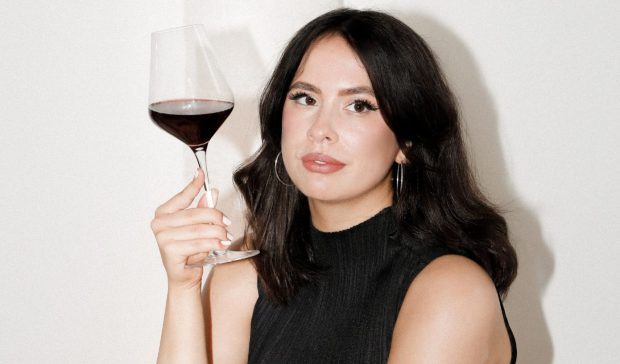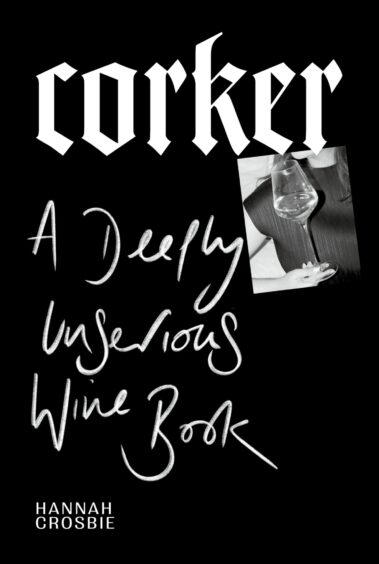
Hannah Crosbie has seen her career get off to a sparkling start – so much so that she’s already been referred to as “the Nigella of wine”.
But that didn’t stop the wine expert from suffering a recent bout of self-doubt about her place in an industry that isn’t, traditionally, overflowing with young Scottish women.
“When I had a moment of crisis and worried that the wine industry wasn’t going to take me seriously or accept me, a friend told me, ‘If people see you as being disruptive then you’re probably shaking things up and doing something right.’ That was great advice!”
As a 26-year-old woman from Edinburgh, Hannah never saw many people like herself in the UK wine scene, where experts or sommeliers are typically “older white dudes”.
Yet Hannah is already making a name for herself as a witty, knowledgeable and relatable wine expert, writer and broadcaster.
She is a regular wine critic for The Independent and The Evening Standard and regularly shares her advice on Channel 4’s Sunday Brunch.
She has also just released her first book, Corker: A Deeply Unserious Wine Book, which, aims to demystify the world of wine.
Corker
Corker serves up straightforward, essential advice on the perfect wine to suit any occasion, and includes a helpful glossary and “cheat sheet” that will help anyone navigate a wine list, bottle shop or packed supermarket aisle.
Her tongue-in-cheek writing style also sets Corker, and its author, apart in an industry that she reckons could do with a sense of humour.
“I’ve always used humour to connect with people, so I find it interesting that humour is very rarely used in wine writing. If anything, it’s used to exclude people,” said Hannah, who moved to London six years ago but says she would love to return to Edinburgh one day.
“I’ve always thought of wine as something that is designed to be shared but the way it’s often communicated can exclude rather than include people and there’s something very wrong with that.”
Hannah’s interest in wine didn’t start at home – her parents “aren’t fully teetotal but close enough” – but in the restaurants she worked in to pay her way through university and later unpaid internships in London to earn her industry qualifications.
During the 2020 lockdown, Hannah grew her audience by regularly posting about affordable wine on Instagram. She later started The Dalston Wine Club as intimate tasting events catered to young people looking to learn more about the drink in a welcoming environment.
Writing and presenting gigs quickly followed, as she “turned her obsession into a career”.
Doing things differently
In Corker, Hannah continues to do things a little differently. Rather than suggesting food and wine pairings, she found that most people wanted a wine paired with a certain situation.
“People would DM me on Instagram, sometimes sending me photos of a supermarket shelf, saying they were confused and asking for recommendations specific to their need,” explained Hannah. “How or where you’re spending your time and with whom really determines what wine you bring, and that bottle can convey a message about yourself to others.”
In Corker, she suggests the best wine for any occasion, such as meeting a partners’ parents for the first time (Cabernet sauvignon: familiar, a bit fancy and found in pretty much any bottle shop or supermarket), the best drink to order when a date’s going well (a smoky and elegant Barolo) or when it’s going bad (Prosecco: by the glass).
Even a drink shared at home with friends deserves a decent vino. When sat on her sofa, she insists, “I’m not drinking a 25-year-old burgundy” but prefers “a chilled Pinot Grigio always goes down well” or a “light, fruit-driven Pinot Noir”.
Hannah admits she has often felt underestimated at industry events and even restaurant dates. “I can’t tell you how many times I’ve been in a restaurant with a man and he’s the one handed the wine list, and even after I order, he’s offered the first taste!” she sighed.
She also believes the wine industry has some way to go to become more inclusive. She said: “There are many women in the wine industry but not in positions of power and that has to change. Women still face harassment and are often paid less than their male counterparts are.
“There also remains an issue of diversity as it’s mostly white, highly educated men and women.
“I hope this book will help me connect with more young women, young people, who are interested in getting into wine but don’t see anyone like them working in the industry. I want to be that person for them.”
Corker by Hannah Crosbie is published by Ebury Press, £16.99, out now.

Enjoy the convenience of having The Sunday Post delivered as a digital ePaper straight to your smartphone, tablet or computer.
Subscribe for only £5.49 a month and enjoy all the benefits of the printed paper as a digital replica.
Subscribe